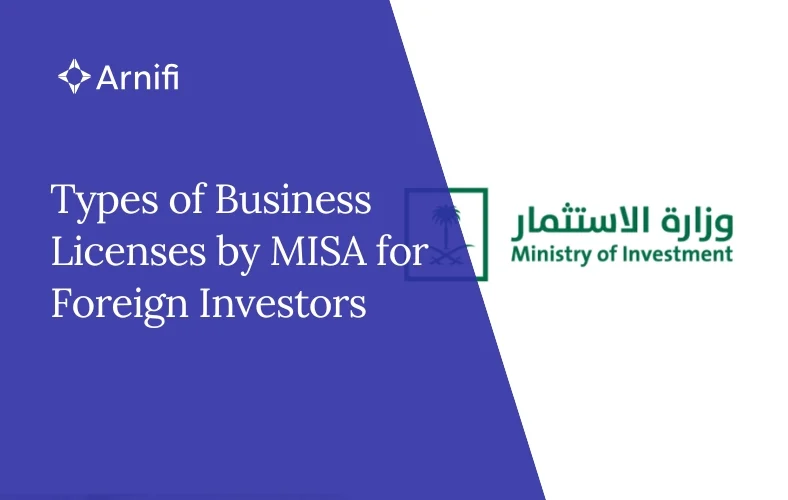Types of Business Licenses by MISA for Foreign Investors
by Shethana Aug 27, 2024  16 MIN READ
16 MIN READ

The Ministry of Investment of Saudi Arabia (MISA) makes it easier for foreign investors. They help with starting and running businesses in the Kingdom. MISA has many services available. They provide details about investment opportunities. They guide investors through the steps for getting licenses. MISA also gives ongoing support to businesses.
MISA wants to create a good environment for investment. They do this by making rules simpler. MISA works to improve transparency. They also offer helpful incentives to bring in foreign money and skills.
Table of contents
- Comprehensive Guide to Obtaining a MISA License
- Detailed Overview of Business Licenses Available Through MISA
- Legal Entity Types Under MISA for Foreign Investors
- Sector-Specific Licenses and Regulations
- Investment Incentives and Benefits Under MISA Licenses
- Challenges and Solutions in Acquiring MISA Business Licenses
- Conclusion
- Frequently Asked Questions
The Purpose of MISA in Attracting Foreign Investment
The main goal of MISA is to help Saudi Arabia grow and develop its economy by bringing in foreign investment. The Ministry wants to make Saudi Arabia a top place for investment in the world.
MISA plans to do this by making it easy to do business, giving great benefits, and offering support to foreign companies as they invest. The Ministry helps highlight important areas of Saudi Arabia, encourages cooperation between local and foreign businesses, and aids in the country’s overall economic growth.
By welcoming foreign investment, MISA hopes to create new jobs, share technology and knowledge, and encourage innovation in Saudi Arabia.
How MISA Differs from Other Regulatory Bodies in Saudi Arabia
In Saudi Arabia, many government groups handle different parts of business operations. However, the Ministry of Investment, known as MISA, is the main point of contact for foreign investors. While other agencies focus on specific areas, MISA takes a more centralized approach to foreign investment.
MISA helps foreign investors connect with other government offices. It makes the licensing and approval process easier. MISA’s job goes beyond just giving out licenses. It also offers ongoing support to foreign businesses, helping them with their questions and guiding them through regulations.
With its focus on investors and wide range of services, MISA makes it simple and efficient for foreign companies to set up in Saudi Arabia.
Comprehensive Guide to Obtaining a MISA License
This section will explain the steps to get a MISA license. We will look at the initial requirements and the application process. Knowing these steps is important for businesses that want to work legally and well in Saudi Arabia’s busy market.
Following the licensing process correctly helps your business enter the market smoothly and quickly.
Initial Requirements and Eligibility for MISA License Application
Before starting the application process for a MISA license, foreign investors must meet certain minimum eligibility criteria. They also need to gather specific documents. The first step is to select a legal entity type, like an LLC, branch office, or joint venture.
The application requires a detailed business plan. This plan should include the investment project, market analysis, financial forecasts, and how it will impact the Saudi economy. The Ministry of Investment of Saudi Arabia (MISA) also needs documents that confirm the investor’s legal status in their home country. They require proof of financial capability and information about the proposed management structure.
It is very important to ensure that all documents are correct and complete. This will help make sure the MISA license application is successful and processed quickly. It is a good idea to consult with legal professionals who know Saudi Arabian investment laws well.
Step-by-Step Process to Apply for a MISA License
The process to get a MISA license has several important steps. It starts with registering online on the MISA portal. Next, you create a profile as an investor and submit important documents, like your business plan.
After MISA reviews and accepts your application, you may need to provide more information or meet additional requirements. The Ministry of Investment carefully looks at your application. They check if your project fits with Saudi Arabia’s economic goals and how it could help the country.
Once your application gets final approval, MISA issues the investment license. This allows you, as a foreign investor, to complete your company registration and other steps needed to start your business in Saudi Arabia. This step confirms your legal status and lets you operate according to Saudi laws.
Detailed Overview of Business Licenses Available Through MISA
This section gives a clear look at the main business licenses offered by MISA. It explains what is needed to apply for each license and how to do it. Each type of license supports different business activities, allowing many foreign companies to join the Saudi market.
It is important for investors to understand the details of each license. This way, they can pick the right one for their business operations.
Commercial License for Trading Activities
The Commercial License is important for businesses that trade in Saudi Arabia. This license allows companies to import, export, distribute, and sell products in the Saudi market. To get a Commercial License, businesses must meet certain requirements from MISA. This includes a minimum capital investment based on the type of trade activity.
Also, companies need to follow the rules for commercial registration. They must get the right permits to import and export certain goods. Getting a Commercial License from MISA lets businesses trade legally within Saudi Arabia’s laws.
The application process requires businesses to send in important documents. This includes a detailed business plan, financial statements, and the necessary permits to MISA so they can be reviewed and approved.
Industrial License for Manufacturing Ventures
Foreign investors who want to start manufacturing in the Kingdom of Saudi Arabia need to get an Industrial License from MISA. This license allows companies to work in industrial activities like producing, processing, and assembling goods.
To get the Industrial License, businesses must follow certain rules related to environmental care, labor laws, and safety. MISA checks if the manufacturing project is realistic, its possible environmental effects, and how it can help Saudi Arabia’s industrial sector.
The Industrial License gives businesses the legal right to build and run industrial facilities, make products, and support the goals for the Kingdom’s economic growth.
Service License for Service-oriented Businesses
Businesses that want to offer services in Saudi Arabia must get a Service License from MISA. This license applies to many service-based companies. These include consulting firms, IT companies, healthcare providers, and schools. Depending on the service, MISA might ask for more permits or certifications.
For example, a professional company in healthcare needs approvals from the Ministry of Health along with the Service License. MISA’s Service License helps ensure that businesses work legally. It also makes sure they keep up quality standards, protect consumer rights, and follow the rules for their specific industries.
To apply, businesses must give important documents to MISA. This includes company registration details, service agreements, and proof of qualifications.
Legal Entity Types Under MISA for Foreign Investors
This section will look at the different types of legal entities that foreign investors can use under MISA. It will compare their features to help investors pick the best option for their business needs. Each choice has its own benefits and factors to think about, such as liability, taxation, and flexibility in operations.
Choosing the right legal entity is important for lasting success and matching the investor’s goals.
Foreign Branch Registration – Pros and Cons
Establishing a branch of a foreign company is a popular way for investors to enter Saudi Arabia. A branch is a part of the parent company and does not have its own legal status.
One main benefit of branch registration is that it is simple and quick to set up. However, it is important to understand that the foreign parent company is fully responsible for the branch’s debts. This means that the parent company’s assets could be at risk because of the branch’s activities in Saudi Arabia.
This type of registration works well for businesses that want a direct presence and wish to carry out activities like the parent company. However, it may not be the best choice for those wanting limited liability or who plan to do a variety of activities that are different from their parent company’s main work.
Wholly Foreign-Owned Enterprises (WFOE) – Structure and Benefits
A wholly foreign-owned enterprise (WFOE) structure allows foreign investors to have full ownership in Saudi Arabia. This setup gives complete control over business operations. It also offers flexibility in decision-making, which is important for strategic direction.
The benefits of a WFOE include the freedom to manage business activities without needing a Saudi partner. This is helpful for companies that have specific operational needs or strategic goals. The Ministry of Investment Saudi Arabia (MISA) takes care of the licensing process. They make sure rules are followed and help foreign investors set up their businesses in the Kingdom.
Joint Ventures with Saudi Partners – Key Considerations
Forming a joint venture with a Saudi partner gives foreign investors a smart way to enter the Saudi market. They can use local knowledge, connections, and expertise. Working together through a joint venture can help them understand the market better and get familiar with cultural details.
Even though joint ventures can be very beneficial, careful thought about important factors is needed. It’s important to pick a reliable Saudi partner who shares similar business goals. It’s also necessary to clearly outline the joint venture’s strategic direction. This includes defining roles, responsibilities, profit-sharing, and exit plans in a legal agreement to make sure the partnership is successful for everyone involved.
Also, grasping the details of Saudi Arabia’s legal and regulatory rules is key when starting a joint venture. Getting professional help can lead to a well-organized agreement that protects everyone’s interests.
Sector-Specific Licenses and Regulations
In Saudi Arabia, different sectors need special licenses and follow certain rules. These rules show what is important for each industry. This part will look at three main sectors: Technology and Innovation, Healthcare, and Construction & Real Estate. It will explain the licensing details for each one.
It’s important for foreign investors to understand these rules. This helps them follow the laws and keeps their business operations running smoothly.
Technology and Innovation Sector Licenses
Saudi Arabia sees the technology sector as a big part of its economic growth and diversification. The country is encouraging foreign investment in technology. They offer many benefits, like tax breaks and funding, to draw in tech companies.
Foreign investors who want to work in Saudi Arabia’s technology sector need to get special licenses. The type of license needed depends on the business activities they plan to do. For example, building software solutions requires a different license than selling e-commerce services or providing fintech options.
MISA is important when it comes to giving licenses to tech companies. They make sure that these companies follow Saudi Arabia’s digital goals and also adhere to rules about data protection, cybersecurity, and intellectual property.
Healthcare and Pharmaceutical Licensing Requirements
The healthcare sector in Saudi Arabia is changing a lot. The government wants to improve healthcare services and buildings. They are encouraging foreign investment. There are many chances in hospitals, making drugs, and medical technology.
However, this industry is sensitive. To get a license to work in healthcare or pharmaceuticals, strict rules must be followed. This means investors need approvals from the Ministry of Health. They must also follow quality standards and rules for importing and selling drugs.
Foreign investors need to show their skills, knowledge, and financial strength. This helps them meet the requirements and make good contributions to the healthcare system in Saudi Arabia.
Construction and Real Estate Development License Insights
The construction and real estate development sector in Saudi Arabia is growing fast. This growth comes from big infrastructure projects and a rising need for homes and businesses. Foreign investors can benefit from this growth. However, they need to understand the licensing rules in this sector.
To get a license for construction or real estate development, companies must get approval from several government bodies. This includes MISA and the Ministry of Municipal and Rural Affairs and Housing. They also need to show they have the right skills, enough money, and that they follow the safety and building rules.
Foreign investors must also understand the rules about land ownership, zoning laws, and environmental assessments. This knowledge is very important for anyone wanting to start projects in construction and real estate development in Saudi Arabia.
Investment Incentives and Benefits Under MISA Licenses
Saudi Arabia gives many benefits and perks to foreign investors. This shows that they are serious about making a good place for business. Here, we will talk about tax breaks, financial help, and access to resources. These points highlight the benefits of working under MISA licenses.
Knowing these incentives helps investors use them wisely. This can lead to better profits and a strong future for their businesses.
Tax Exemptions and Financial Incentives for Foreign Investors
One great thing for foreign businesses with MISA licenses is the tax breaks and financial perks available. These incentives help lower costs, boost profits, and encourage investors to stay long-term in the Kingdom.
Tax breaks can include holidays from corporate income tax for set times, lower import taxes on materials and equipment, and no withholding tax on dividends. Foreign investors can also enjoy financial advantages, like lower land lease prices, funding for research, and support from government-backed financial plans.
These benefits help cut operation costs, improve cash flow, and increase the overall return on investment for foreign businesses.
Access to Strategic Resources and Local Market Insights
Beyond money rewards, MISA helps foreign businesses by providing important resources and insights about the local market. It’s important to understand the details of the Saudi Arabian market for running a successful business.
MISA connects foreign businesses with local partners, suppliers, and distributors. This makes it easier for them to enter and grow in the market. The Ministry also shares market research, industry reports, and useful data. This helps businesses make smart choices about their target audiences, competition, and market trends.
MISA also helps foreign investors understand cultural differences, build good relationships with local people, and learn business etiquette. This makes communication and business development better.
Challenges and Solutions in Acquiring MISA Business Licenses
Foreign investors might still face issues even with easier steps to get MISA business licenses. This section points out the usual problems and legal challenges. It also provides useful ways to step over these obstacles.
By tackling these challenges, foreign businesses can have a quicker and easier time obtaining their licenses.
Common Pitfalls in the Licensing Process and How to Avoid Them
Navigating the licensing process in a new country can be tricky. A common issue is not sending complete or accurate documents. It is important to check all required paperwork carefully. Make sure it is correct and complete. Getting help from a professional company that specializes in Saudi business setup can make this process easier.
Another challenge is not realizing how long approvals can take. The licensing process may take more time than you think. This is especially true if your business needs extra permits or approvals from other government offices. Working closely with MISA, asking for help when you need it, and answering questions quickly can speed up the process.
Also, clear communication with MISA officials is key. Responding on time and addressing any concerns can help prevent delays and make the licensing experience smoother.
Legal and Regulatory Hurdles for Foreign Entities
Foreign companies in Saudi Arabia can face challenges due to rules about foreign ownership, labor laws, and data protection. It’s very important for them to understand these rules to avoid issues and follow the law.
For example, some industries may have limits on foreign ownership. This often means companies need to partner with local businesses. It is also key to know about hiring, sponsoring visas for foreign workers, and meeting Saudization requirements.
It’s a good idea to get help from lawyers who know Saudi Arabian business law. They can help companies set up their business properly, follow the rules, and avoid legal problems.
Conclusion
In conclusion, it is important to understand how to get business licenses under MISA if you are a foreign investor in Saudi Arabia. The easy process, specific licenses for different sectors, and good incentives from MISA make it easier to grow a business. By tackling challenges, knowing the legal needs, and using the benefits of MISA licenses, foreign ventures can do well in the Saudi market. By carefully handling the licensing process and following the rules, foreign investors can take advantage of the chances MISA offers to build their business.
Frequently Asked Questions
What Are the Differences Between MISA and SAGIA Licenses?
In Saudi Arabia, MISA and SAGIA are the same organization. SAGIA, which stands for Saudi Arabian General Investment Authority, was changed to MISA, meaning Ministry of Investment, in 2020. So now, a “SAGIA license” is called a “MISA license.” Both of these names relate to licenses for foreign investment.
Can a Foreign Investor Own 100% of a Saudi Company Under MISA?
Yes, MISA rules allow foreign investors to own 100% of a Saudi company. This depends on the type of legal entity and the business activity. WFOEs give full foreign ownership, but other types might have different rules.
What Is the Time Frame for Obtaining a MISA License?
The time it takes to get a MISA license in Saudi Arabia can vary. This depends on things like how complex your business is, how complete your documents are, and how fast the government processes them. Usually, it can take a few weeks to several months.
Are There Any Restrictions on the Type of Business Activities for Foreign Investors?
Saudi Arabia wants foreign investment. However, there are some rules about business activities for foreign investors. This is especially true in areas like oil and gas extraction, media, and defense. MISA offers clear guidelines on which sectors are restricted.
About Arnifi
Arnifi is digital first Corporate service provider helping companies enter the Middle East region, starting with UAE and Saudi Arabia markets. Founded and backed by professionals from Amazon, Souq and other large companies operating in KSA – the team understands what it takes to succeed as a startup in both UAE and Saudi Arabian markets, apart from going through the setup process multiple times. Arnifi will provide a truly digital experience to entry and scale up of companies both UAE and Saudi Arabia. Discover tailored solutions and strategic partnerships that propel your business forward. Check out at – www.Arnifi.com for more details.
Also Read: Ultimate Guide to Qiwa Payroll System in Saudi Arabia
Top UAE Packages

Related Articles
Top UAE Packages



